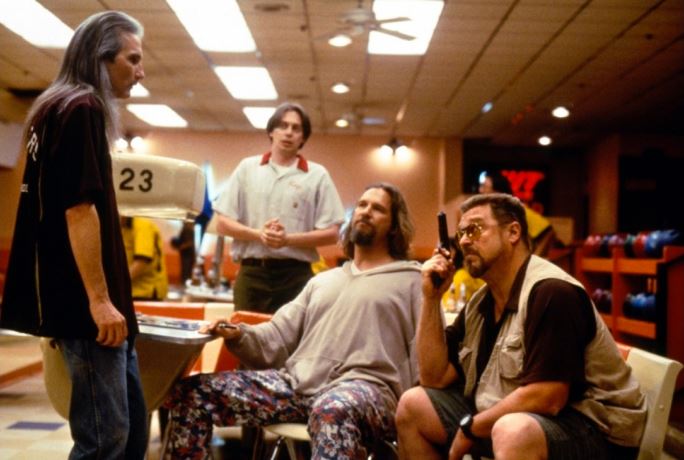Dani Klemes, web editor-in-chief
“The Big Lebowski” (1998) possesses a certain attitude—one that makes unemployment and incessant bowling seem a little less bleak; one that transcends the commonality of other crime comedies.

The scattered storyline follows stoner Jeffrey Lebowski (Jeff Bridges), nicknamed “The Dude,” who is mistaken for well-off philanthropist Jeffrey Lebowski (David Huddleston), a man targeted by a group of German nihilists who are after a large sum of money. After the Lebowskis acquaint themselves with each other in a meeting organized by Lebowski’s butler Brandt (Philip Seymour Hoffman), the two return to their separate lives—Lebowski to his charity duties and The Dude to his White Russians. Following their brief encounter, Lebowski’s trophy wife Bunny (Tara Reid) is kidnaped and Lebowski employs the help of The Dude (supported by his best friend Walter Sobchak (John Goodman)) to get to the bottom of things.
Written and directed by the Coen brothers (Joel and Ethan), the film plays out as a more toned-down version of Quentin Tarantino’s “Pulp Fiction” (1994)—brimming with similar debauchery and identical bob-and-bangs hairstyles (Julianne Moore and Uma Thurman both sport the dark fringe cut).
The movie is powered by The Dude’s lazed, Bermuda-clad personality. His passive mentality puts viewers at ease—his laissez-faire attitude is the perfect balance for the zoo of extroverts in the film. Interestingly enough, he’s based on a real person: freelance publicist Jeff Dowd, one of the major driving factors behind “Blood Simple” (the Coens’ first production in 1984).
The film is genius in that it doesn’t take itself seriously. For a story about nihilists and kidnap ransom, “The Big Lebowski” does an impressive job of employing humor and absurdist undertones. Rarely are there films that can mock sex offenders and sedative-induced hallucinations and get away with it.
Though the movie is entertaining, a major criticism of the plot is that it doesn’t exist. True, there are scenes in the story that invalidate themselves, and yes, the twist may be a bit underwhelming, but the Coens’ point in making the film was to portray a temperament, a lifestyle. There may be unanswered questions, and there there may be loopholes, but there are things to learn from “the laziest man in Los Angeles County.”
The Dude handles things in his own fashion. His abiding self-assurance and perpetual supply of half-and-half are reminders that confidence and passion go hand in hand. I happily give this film a 7.5 out of 10.





































